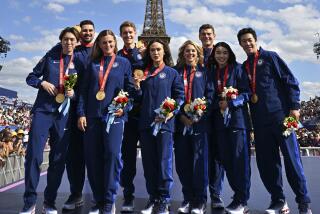The Going Gets Weird
- Share via
TURIN, Italy — With his Olympic dream within his grasp, Evgeni Plushenko remained cool and composed.
With a silver medal his for the taking, three-time U.S. figure skating champion Johnny Weir melted faster than an icicle on a stove, his excuses outnumbering the jumps he landed in a haphazard long program Thursday night that dropped him to fifth place.
“I didn’t feel my inner peace. I didn’t feel my aura was right,” said Weir, who began to improvise jumps early in his routine and did only one combination jump, not nearly enough to win a junior competition.
“I felt black inside.... I’m bummed.”
He also said he missed the 8:40 p.m. bus from the athletes’ village to the Palavela arena because he wasn’t aware that the schedule had changed. He finally got a lift in a volunteer’s car and arrived at 9:20, but he said he had to hurry to get onto the ice for his 10:07 warmup.
“My biorhythms were off,” he said.
His coach, Priscilla Hill, said Weir “may have been a little rushed, but not out of the ordinary, and he warmed up well.” She added, “As his coach, I feel it was a great deal of pressure he’s never dealt with before.... I don’t think the schedule had anything to do with it.”
Nothing distracted Plushenko, whose golden moment was widely expected and well-earned.
With 258.33 points, Plushenko finished an astonishing 27.12 points ahead of Stephane Lambiel of Switzerland, who stumbled through his routine but moved up from third to second, with 231.21 points. Canada’s Jeffrey Buttle rose from sixth to third with 227.59 points, despite a fall on a quadruple jump. “He has pushed skating more than anyone I can think of, and his consistency is incredible,” Buttle said of Plushenko. “Just being on the podium with him is an honor.”
The 23-year-old from St. Petersburg, Russia, outclassed the field to become the fifth consecutive skater from the Soviet Union or Russia to win the men’s singles gold medal. His only sins Thursday were a double flip instead of a triple flip late in his routine to “The Godfather,” and his customary inability to show enough emotion to transform fans’ admiration for his technical prowess into affection for him and the character he played. He earned 167.67 points, his personal best for a long program.
“Four years ago, it was not my Olympic Games,” said Plushenko, who finished second at Salt Lake City to fellow Russian and bitter rival Alexei Yagudin.
“This year, this Olympic Games, this is mine. That is for sure.”
Plushenko said the interval between Salt Lake City and Turin “was not long. It was hard,” referring to knee and back problems and the double-hernia surgery he underwent last May.
He thanked his longtime coach, Alexei Mishin, his parents and his wife of eight months, Maria.
“I have a great coach and I also have something inside me, and also I like to work and to compete,” he said.
His performance, he said, “was nothing special. I did my job, what I need for the gold medal.”
Weir’s poor performance, two days after he’d presented a precise and expressive short program, stunned the crowd and scrambled the standings. Chicagoan Evan Lysacek, so weak from flu that he had considered withdrawing while riding the bus to the arena, finished fourth.
Lysacek, consigned to 10th place in Tuesday’s short program after committing two major errors, moved up six spots on the strength of his polished “Carmen” program and missed the bronze medal by slightly more than seven points, with a total of 220.13.
Matt Savoie of Peoria, Ill., moved up from eighth to seventh with a polished, assured skate.
Lysacek said he’d required intravenous fluids to treat a bad case of stomach flu and that his veins collapsed while medical personnel took six painful pokes to get fluids into him. He said he thought about turning around when he began to feel nauseated during the ride to the arena, but he toughed out a fine effort.
“I thought the Olympics were about being perfect and being well-trained. I learned the Olympics are about courage and finishing what you started,” said Lysacek, who trains in El Segundo.
“I was close to getting a medal, and I think that if I was a little bit better in the short program, I would have challenged for a medal. So that’s upsetting, but it gives me a lot of confidence.”
Weir replaced a planned quadruple toe loop, worth nine points in the new scoring system, with a double axel, worth 3.3 points. He stepped out of a double axel that should have been a triple axel, eliminated the last two parts of a planned three-jump combination, did a sloppy triple flip and lacked speed in all his elements.
“I was terrified sick,” he said. “I wasn’t comfortable and that’s why I was so scared. I was late getting over here and I don’t think I ever got caught up....
“I learned that I definitely want to stay in a hotel the next time I compete in an Olympic Games. Other than that, I didn’t learn anything.”
It’s probably just as well, then, that he didn’t learn that Plushenko plans to continue competing through the 2010 Olympics.
“I am 23 years old. The next Olympic Games I will be 27. Not old,” Plushenko said.
And unlike Weir, in no rush to get where he’s going.
More to Read
Go beyond the scoreboard
Get the latest on L.A.'s teams in the daily Sports Report newsletter.
You may occasionally receive promotional content from the Los Angeles Times.







